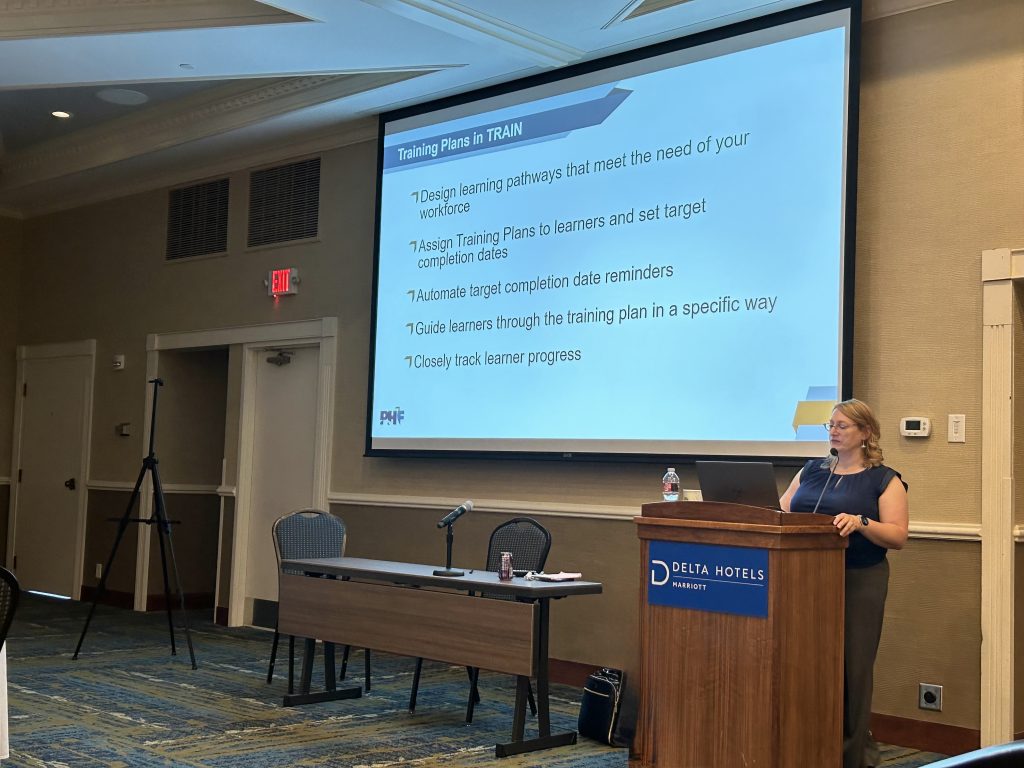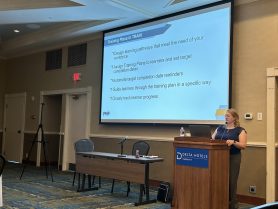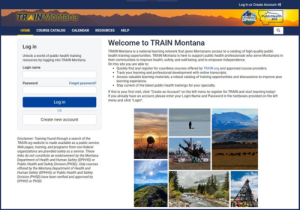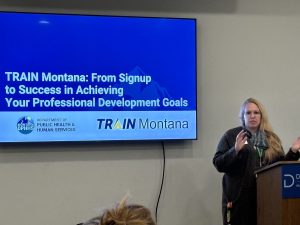Montana Leverages Virtual Platform to Optimize Training and Improve Service Delivery Across the State
- By: Chloe Lake
- Date
Montana’s public health system is broad and decentralized, with 60 local and tribal health departments spread across urban centers, rural communities, and remote frontier areas. The Montana Department of Public Health and Human Services, Public Health and Safety Division works to ensure that the state’s public health workforce is as effective as possible by supporting workforce development and training at each of these health departments via their Public Health System Improvement Office (PHSIO). However, delivering high-quality, up-to-date training and skills-building resources to staff at these diverse health departments has been a logistical challenge for years. While some local and tribal health departments created workforce development plans tailored to meet the needs of their communities, limited funding, resources, and staff capacity often made it impossible to fully implement these plans.
To address this challenge, Montana turned to the TRAIN Learning Network, a national platform powered by the Public Health Foundation (PHF) that provides access to thousands of high-quality, expertly vetted trainings for agencies and individuals in the public health, healthcare, and preparedness sectors. Montana purchased its own customized version of the platform, TRAIN Montana, then rolled it out statewide using Public Health Infrastructure Grant (PHIG) technical assistance from PHF in April 2024. Since then, the Public Health System Improvement Office’s Workforce Development Program has been leveraging TRAIN Montana to transform workforce development efforts across the state.
TRAIN Montana Solves Persistent Challenges
Kaela Schommer, the Instructional Coordinator within Montana’s Public Health System Improvement Office’s Workforce Development Program and the TRAIN Montana Administrator, plays a pivotal role in the success of this initiative. She works one-on-one with local and tribal health departments to align their workforce development goals with available content on TRAIN Montana, customizing resources as needed.
“One of our Lewis and Clark Public Health core values is effectiveness. To be more effective at what we do, we need to continue to learn and grow in our fields. Kaela is helping us build a meaningful and targeted annual training plan in TRAIN Montana, which will serve as a tool to improve our service delivery, further staff knowledge, and ultimately improve our workforce.”
– County health department employee
Schommer and her team have used TRAIN Montana to address critical issues impacting workforce development, ultimately (1) increasing efficiency and accountability, (2) resolving travel and cost barriers, and (3) increasing access to timely and trusted resources.
Increasing Efficiency & Accountability
Local and tribal health departments have limited staff and resources to identify, implement, and track workforce development, training, and licensure activities. Previously, it could take weeks to research, review, approve, and often reformat free training materials. This ad hoc process was time-consuming and inefficient, often delaying essential training. TRAIN Montana allows health departments – at the state and local level – to quickly identify and disseminate ready-to-use, high-quality resources. Critically, TRAIN Montana also allows health department leadership to easily track who has completed trainings and licensure requirements.
“Each year, we create an annual training plan based on the needs outlined in our Workforce Development plan. This takes many hours of researching educational opportunities and trying to find opportunities that fit. Having the TRAIN platform takes a lot of the heavy lifting out of creating that plan, and makes it easy to find and track meaningful opportunities for continuing education.”
– County health department employee, on how TRAIN Montana streamlines their workforce development activities.
Resolving Travel and Cost Barriers
A 2022 public health workforce assessment in Montana found that two major barriers to completing workforce development were cost and the logistics of travel to in-person trainings. Montana’s expansive geography and challenging weather conditions make in-person training impractical for much of the year. Additionally, many local and tribal health departments operate on tight budgets that cannot accommodate costly trainings, conferences, or workshops. TRAIN Montana offers a cost-effective, virtual solution. Many courses on TRAIN also provide continuing education credits at no cost to the health department.
Increasing Access to Timely and Trusted Resources for Staff & External Partners
Health department staff were often wary of downloading materials sent via email or clicking unfamiliar links to access online trainings and resources. TRAIN Montana serves as a trusted and familiar resource that alleviates these concerns by curating content from reputable organizations like the CDC, the American Public Health Association, and the American Academy of Pediatrics. and other international TRAIN Learning Network contributors. TRAIN Montana also ensures that the latest information can be shared quickly. For example, when the CDC released a new, four-part series to increase vaccination rates, this could be shared immediately with local and tribal health departments via TRAIN Montana. Health departments can also share TRAIN Montana courses and resources with external partners and stakeholders to further joint efforts.
“Since our health department is so small, we use it to educate and train our stakeholders and partners, which can often help the individuals and organizations meet their own training requirements. One course I encouraged Local Emergency Planning Committee (LEPC) members to take was in relation to mass shootings. This gave us a chance to get some education on mass shooting criteria to focus on, which will enable us to implement a tabletop exercise in the near future.”
– Prairie County Health Department
Customized Support for Local & Tribal Health Departments
Customized support from PHSIO’s Workforce Development Program and access to the TRAIN learning network is designed to strengthen the overall public health workforce, but also to bolster recruitment and retention at individual health departments. Local and tribal health departments can use TRAIN Montana for specific agency goals – for example, some are currently using the system to streamline onboarding processes, support reaccreditation efforts, or offer robust professional development opportunities for staff.
This approach strengthens trust and partnership between Montana’s local and tribal health departments and PHSIO. Kaela and her team provide personalized support, ensuring users feel confident navigating TRAIN Montana. Whether it’s resetting a password or customizing trainings down to the individual level, the office’s hands-on approach offers a pathway to better collaboration within a decentralized system.
How it Started: Health Departments Engaged in the Design of TRAIN Montana
PHSIO engaged health departments at every step, from gathering feedback from health department leaders on platform customizations to piloting TRAIN Montana from September 2023 – March 2024 with a select group of health departments representing urban, rural, and frontier areas. This approach allowed them to identify and resolve issues before launching the platform statewide.
 To ensure a smooth rollout, PHSIO submitted a request through the PHIVE (Public Health Infrastructure Virtual Engagement) portal for assistance from PHF. In April 2024, PHF and PHSIO staff introduced the system to Montana’s public health workforce in person at Confluence 2024, Montana’s Annual Public and Environmental Health Conference. They conducted hands-on training for local and tribal health department staff, as well as health department staff who serve as TRAIN administrators, who are responsible for creating training plans, tracking completions, viewing transcripts, and uploading materials. For staff who could not attend in person, PHF ensured statewide accessibility by hosting virtual sessions as part of the Montana Public Health Summer Institute. PHSIO also coordinated with PHF staff to host four additional training sessions during the Montana Public Health Summer Institute in July 2024.
To ensure a smooth rollout, PHSIO submitted a request through the PHIVE (Public Health Infrastructure Virtual Engagement) portal for assistance from PHF. In April 2024, PHF and PHSIO staff introduced the system to Montana’s public health workforce in person at Confluence 2024, Montana’s Annual Public and Environmental Health Conference. They conducted hands-on training for local and tribal health department staff, as well as health department staff who serve as TRAIN administrators, who are responsible for creating training plans, tracking completions, viewing transcripts, and uploading materials. For staff who could not attend in person, PHF ensured statewide accessibility by hosting virtual sessions as part of the Montana Public Health Summer Institute. PHSIO also coordinated with PHF staff to host four additional training sessions during the Montana Public Health Summer Institute in July 2024.
What’s Next: Building Capacity for Improved Public Health Services
In 2024, PHSIO’s Local and Tribal Support Program conducted an in-person foundational public health services assessment of all 60 local and tribal health departments. The results of the assessment will help inform how programs can utilize TRAIN Montana to address identified gaps in providing foundational public health services across the state.
Currently, 37% of Montana’s local and Tribal health departments have designated TRAIN administrators, though more health department staff access TRAIN Montana. Since February 2024, 2,050 people maintained active user accounts, and users registered for over 6,300 courses. PHSIO aims to increase the number of local administrators in the state while providing ongoing support to health departments to help them maximize the platform and use it to meet specific agency needs. This includes:
- A monthly learning series called Trailblazing with TRAIN Montana;
- Custom training plans for each of the 60 health departments based on identified gaps from the Foundational Public Health Services assessment; and
- An upcoming initiative that will allow high schoolers to use TRAIN Montana to explore public health topics and potential career paths. This is intended to strengthen Montana’s public health workforce pipeline, giving young people exposure to the field and helping them see how they could thrive in a public health career.
While PHIG supported the successful rollout of TRAIN Montana, PHSIO is seeking ways to ensure funding for the platform is sustained, as accessible, high quality workforce development resources are critical to ensure Montana’s public health workforce can provide essential services to community members.
How Can Other Health Departments Replicate This?
Technical assistance with workforce training and other critical public health infrastructure needs is available to PHIG recipient health departments via PHIVE request. Technical assistance is tailored to each agency’s specific needs, while offering expertise and lessons learned from helping other agencies.
This work is supported by funds made available from the Centers for Disease Control and Prevention (CDC) of the U.S. Department of Health and Human Services (HHS), National Center for STLT Public Health Infrastructure and Workforce, through OE22-2203: Strengthening U.S. Public Health Infrastructure, Workforce, and Data Systems grant. The contents are those of the author(s) and do not necessarily represent the official views of, nor an endorsement, by CDC/HHS, or the U.S. Government.




 Subscribe To Our Communications
Subscribe To Our Communications